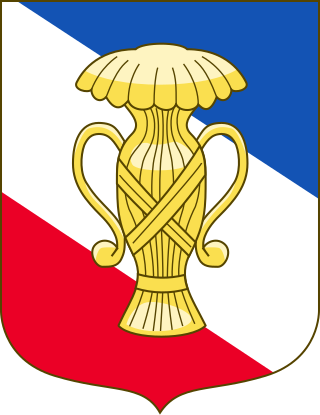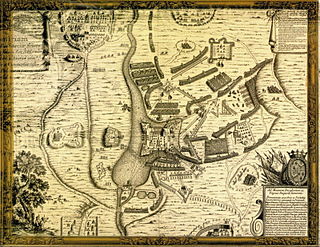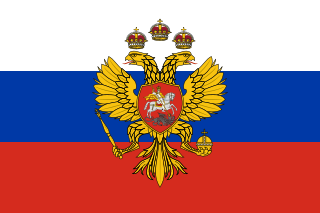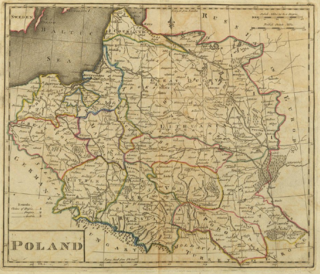
The House of Vasa or Wasa was an early modern royal house founded in 1523 in Sweden. Its members ruled the Kingdom of Sweden from 1523 to 1654 and the Polish–Lithuanian Commonwealth from 1587 to 1668; its agnatic line became extinct with the death of King John II Casimir of Poland in 1672.
"Northern Wars" is a term used for a series of wars fought in northern and northeastern Europe from the 16th to the 18th century, primarily between the territorial rivals of the Swedish Empire, Tsardom of Russia, Poland–Lithuania, and Denmark–Norway. The Great Northern War is generally considered to have concluded the Northern Wars with the decline of Sweden and establishment of the Russian Empire as the principal power of the region, however there are different scholarly opinions on which war constitutes the First Northern War and an internationally agreed-on nomenclature for these wars has not yet been devised.
During the 17th century, despite having scarcely more than 1 million inhabitants, Sweden emerged to have greater foreign influence, after winning wars against Denmark–Norway, the Holy Roman Empire, Russia, and the Polish–Lithuanian Commonwealth. Its contributions during the Thirty Years' War under Gustavus Adolphus helped determine the political, as well as the religious, balance of power in Europe.

The Deluge was a series of mid-17th-century military campaigns in the Polish–Lithuanian Commonwealth. In a wider sense, it applies to the period between the Khmelnytsky Uprising of 1648 and the Truce of Andrusovo in 1667, comprising the Polish theatres of the Russo-Polish and Second Northern Wars. In a stricter sense, the term refers to the Swedish invasion and occupation of the Commonwealth as a theatre of the Second Northern War (1655–1660) only; in Poland and Lithuania this period is called the Swedish Deluge, or less commonly the Russo–Swedish Deluge due to the simultaneous Russo-Polish War. The term "deluge" was popularized by Henryk Sienkiewicz in his novel The Deluge (1886).

The Northern War of 1655–1660, also known as the Second Northern War, First Northern War or Little Northern War, was fought between Sweden and its adversaries the Polish–Lithuanian Commonwealth (1655–60), the Tsardom of Russia (1656–58), Brandenburg-Prussia (1657–60), the Habsburg monarchy (1657–60) and Denmark–Norway. The Dutch Republic waged an informal trade war against Sweden and seized the colony of New Sweden in 1655, but was not a recognized part of the Polish–Danish alliance.
The Polish Army is the name applied to the military forces of Poland. The name has been in use since the early 19th century, although it can be used to refer to earlier formations as well. Polish Armed Forces consist of the Army, Navy and Air Force branches and are under the command of the Ministry of National Defense.

Farther Pomerania, Hinder Pomerania, Rear Pomerania or Eastern Pomerania, is a subregion of the historic region of Pomerania in north-western Poland, mostly within the West Pomeranian Voivodeship, while its easternmost parts are within the Pomeranian Voivodeship.

The Treaty of Stuhmsdorf, or Sztumska Wieś, was a treaty signed on 12 September 1635 between the Polish–Lithuanian Commonwealth and the Swedish Empire in the village of Stuhmsdorf, Poland, just south of Stuhm (Sztum).

The Russo-Polish War of 1654–1667, also called the Thirteen Years' War, Muscovite War of 1654–1667 and the First Northern War, was a major conflict between the Tsardom of Russia and the Polish–Lithuanian Commonwealth. Between 1655 and 1660, the Swedish invasion was also fought in the Polish–Lithuanian Commonwealth and so the period became known in Poland as "The Deluge" or Swedish Deluge.
The Polish–Swedish War of 1626–1629 was the fourth stage in a series of conflicts between Sweden and Poland fought in the 17th century. It began in 1626 and ended four years later with the Truce of Altmark and later at Stuhmsdorf with the Treaty of Stuhmsdorf.

The Tsardom of Russia, also known as the Tsardom of Muscovy, was the centralized Russian state from the assumption of the title of tsar by Ivan IV in 1547 until the foundation of the Russian Empire by Peter the Great in 1721.
Polish–Ottoman Wars can refer to one of the several conflicts between the Polish–Lithuanian Commonwealth and the Ottoman Empire:

The ethnonyms for the Poles (people) and Poland include endonyms and exonyms. Endonyms and most exonyms for Poles and Poland derive from the name of the West Slavic tribe of Polans (Polanie), while in some languages the exonyms for Poland to derive from the name of another tribe – the Lendians (Lędzianie).
The early modern era of Polish history follows the Late Middle Ages. Historians use the term early modern to refer to the period beginning in approximately 1500 AD and lasting until around the Napoleonic Wars in 1800 AD.

The relations between Denmark and Sweden span a long history of interaction. The inhabitants of each speak related North Germanic languages, which have a degree of mutual intelligibility. Both countries formed part of the Kalmar Union between 1397 and 1523, but there exists an inherited cultural competition between Sweden and Denmark. From 1448 to 1790 the two kingdoms went to war against each other at nearly every opportunity; in more than one case a new king tried to prove his worth by waging war on the other country for little or no political reason. Eleven Dano-Swedish wars took place between 1521 and 1814.
Events from the year 1618 in Sweden











